The Cambridge History of China. Vol. 12: Republican China, 1912-1949, Part 1
Подождите немного. Документ загружается.

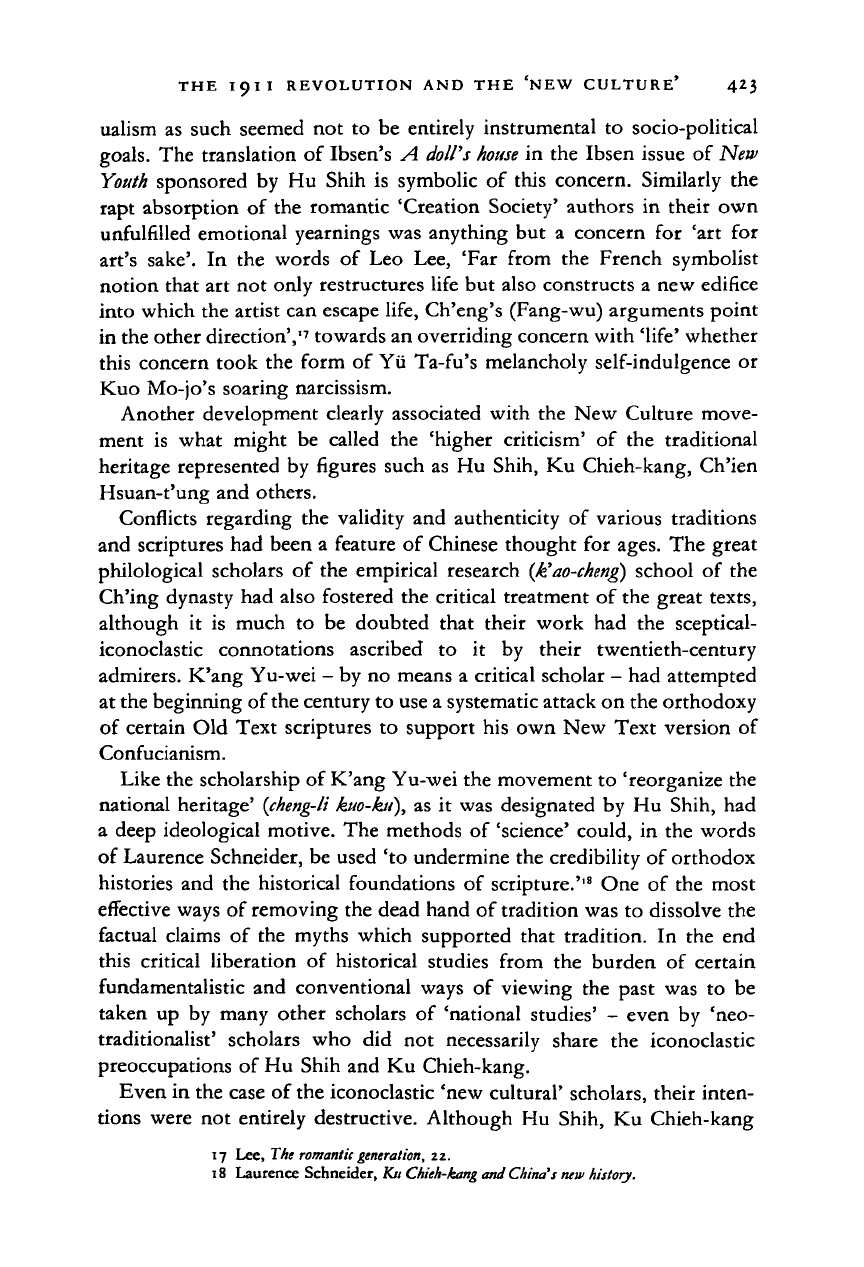
THE 191
I
REVOLUTION AND THE NEW CULTURE 423
ualism as such seemed not to be entirely instrumental to socio-political
goals.
The translation of Ibsen's A
doll's house
in the Ibsen issue of New
Youth sponsored by Hu Shih is symbolic of this concern. Similarly the
rapt absorption of the romantic 'Creation Society' authors in their own
unfulfilled emotional yearnings was anything but a concern for 'art for
art's sake'. In the words of Leo Lee, 'Far from the French symbolist
notion that art not only restructures life but also constructs a new edifice
into which the artist can escape life, Ch'eng's (Fang-wu) arguments point
in the other direction','
7
towards an overriding concern with 'life' whether
this concern took the form of Yii Ta-fu's melancholy self-indulgence or
Kuo Mo-jo's soaring narcissism.
Another development clearly associated with the New Culture move-
ment is what might be called the 'higher criticism' of the traditional
heritage represented by figures such as Hu Shih, Ku Chieh-kang, Ch'ien
Hsuan-t'ung and others.
Conflicts regarding the validity and authenticity of various traditions
and scriptures had been a feature of Chinese thought for ages. The great
philological scholars of the empirical research
(k'ao-cheng)
school of the
Ch'ing dynasty had also fostered the critical treatment of the great texts,
although it is much to be doubted that their work had the sceptical-
iconoclastic connotations ascribed to it by their twentieth-century
admirers. K'ang Yu-wei - by no means a critical scholar - had attempted
at the beginning of the century to use a systematic attack on the orthodoxy
of certain Old Text scriptures to support his own New Text version of
Confucianism.
Like the scholarship of K'ang Yu-wei the movement to 'reorganize the
national heritage'
(cheng-li
ktto-ku),
as it was designated by Hu Shih, had
a deep ideological motive. The methods of 'science' could, in the words
of Laurence Schneider, be used 'to undermine the credibility of orthodox
histories and the historical foundations of scripture.'
18
One of the most
effective ways of removing the dead hand of tradition was to dissolve the
factual claims of the myths which supported that tradition. In the end
this critical liberation of historical studies from the burden of certain
fundamentalistic and conventional ways of viewing the past was to be
taken up by many other scholars of 'national studies' - even by 'neo-
traditionalist' scholars who did not necessarily share the iconoclastic
preoccupations of Hu Shih and Ku Chieh-kang.
Even in the case of the iconoclastic 'new cultural' scholars, their inten-
tions were not entirely destructive. Although Hu Shih, Ku Chieh-kang
17 Lee, The
romantic
generation,
22.
18 Laurence Schneider, Ku
Chieh-kang
and
China's new
history.
Cambridge Histories Online © Cambridge University Press, 2008
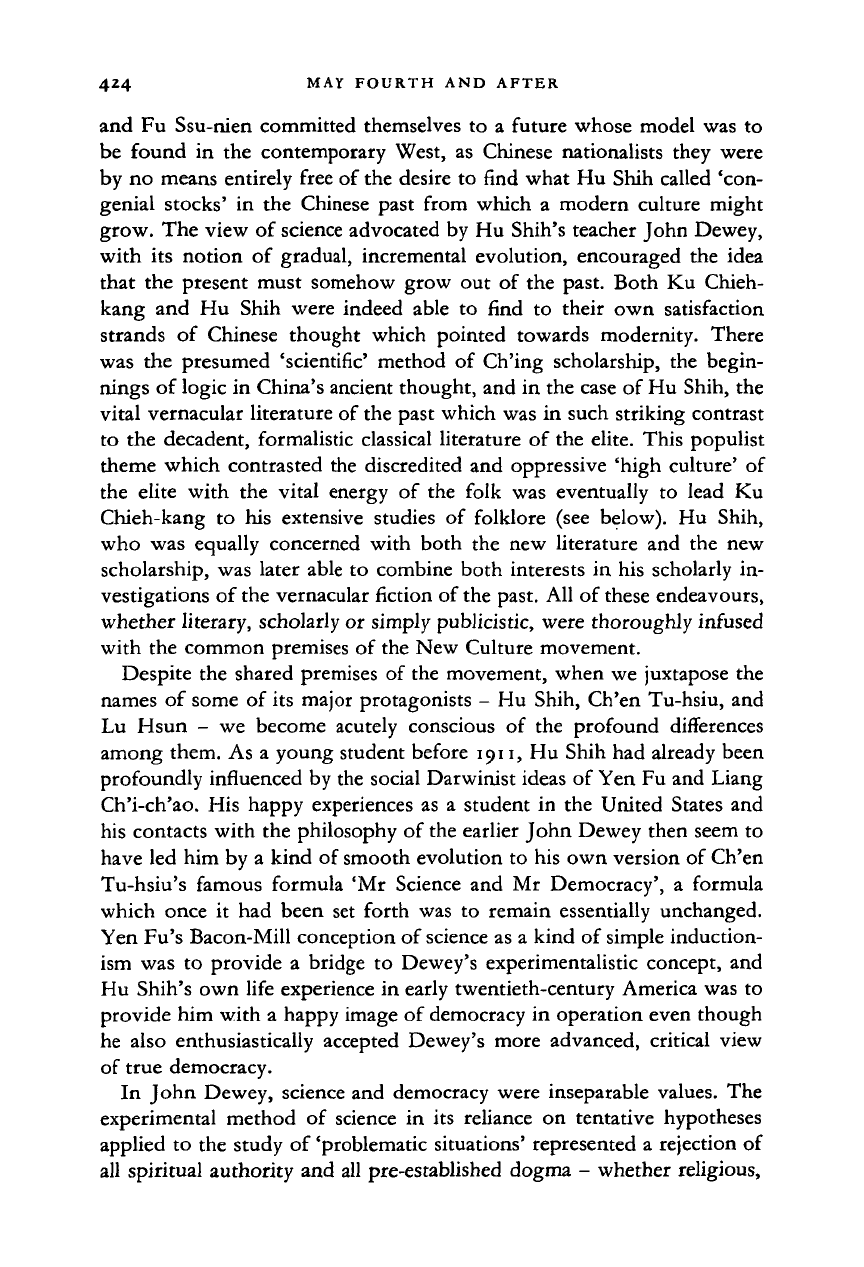
424 MAY FOURTH AND AFTER
and Fu Ssu-nien committed themselves to a future whose model was to
be found in the contemporary West, as Chinese nationalists they were
by no means entirely free of the desire to find what Hu Shih called 'con-
genial stocks' in the Chinese past from which a modern culture might
grow. The view of science advocated by Hu Shih's teacher John Dewey,
with its notion of gradual, incremental evolution, encouraged the idea
that the present must somehow grow out of the past. Both Ku Chieh-
kang and Hu Shih were indeed able to find to their own satisfaction
strands of Chinese thought which pointed towards modernity. There
was the presumed 'scientific' method of Ch'ing scholarship, the begin-
nings of logic in China's ancient thought, and in the case of Hu Shih, the
vital vernacular literature of the past which was in such striking contrast
to the decadent, formalistic classical literature of the elite. This populist
theme which contrasted the discredited and oppressive 'high culture' of
the elite with the vital energy of the folk was eventually to lead Ku
Chieh-kang to his extensive studies of folklore (see below). Hu Shih,
who was equally concerned with both the new literature and the new
scholarship, was later able to combine both interests in his scholarly in-
vestigations of the vernacular fiction of the past. All of these endeavours,
whether literary, scholarly or simply publicistic, were thoroughly infused
with the common premises of the New Culture movement.
Despite the shared premises of the movement, when we juxtapose the
names of some of its major protagonists - Hu Shih, Ch'en Tu-hsiu, and
Lu Hsun - we become acutely conscious of the profound differences
among them. As a young student before 1911, Hu Shih had already been
profoundly influenced by the social Darwinist ideas of Yen Fu and Liang
Ch'i-ch'ao. His happy experiences as a student in the United States and
his contacts with the philosophy of the earlier John Dewey then seem to
have led him by a kind of smooth evolution to his own version of Ch'en
Tu-hsiu's famous formula 'Mr Science and Mr Democracy', a formula
which once it had been set forth was to remain essentially unchanged.
Yen Fu's Bacon-Mill conception of science as a kind of simple induction-
ism was to provide a bridge to Dewey's experimentalistic concept, and
Hu Shih's own life experience in early twentieth-century America was to
provide him with a happy image of democracy in operation even though
he also enthusiastically accepted Dewey's more advanced, critical view
of true democracy.
In John Dewey, science and democracy were inseparable values. The
experimental method of science in its reliance on tentative hypotheses
applied to the study of 'problematic situations' represented a rejection of
all spiritual authority and all pre-established dogma - whether religious,
Cambridge Histories Online © Cambridge University Press, 2008
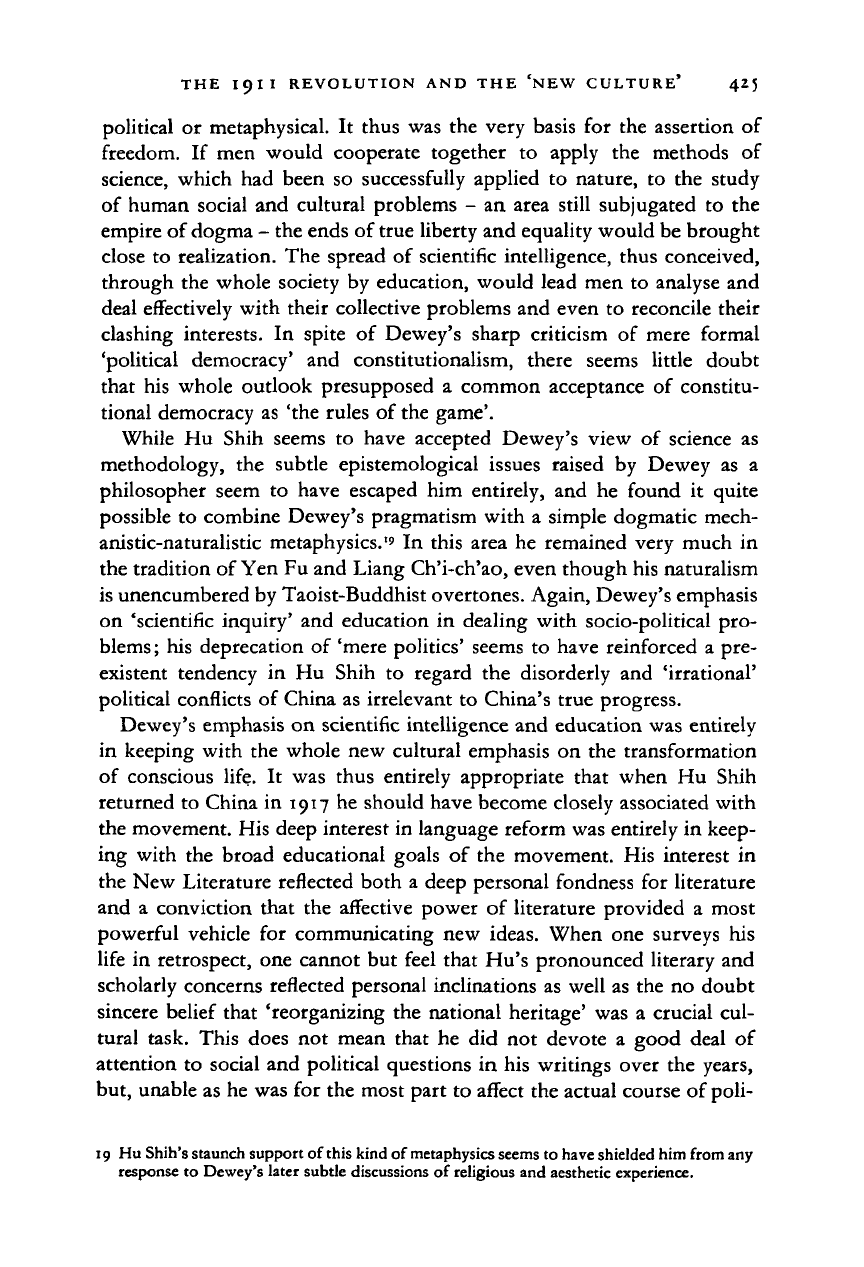
THE 191
I
REVOLUTION AND THE 'NEW CULTURE* 425
political or metaphysical. It thus was the very basis for the assertion of
freedom. If men would cooperate together to apply the methods of
science, which had been so successfully applied to nature, to the study
of human social and cultural problems - an area still subjugated to the
empire of dogma - the ends of true liberty and equality would be brought
close to realization. The spread of scientific intelligence, thus conceived,
through the whole society by education, would lead men to analyse and
deal effectively with their collective problems and even to reconcile their
clashing interests. In spite of Dewey's sharp criticism of mere formal
'political democracy' and constitutionalism, there seems little doubt
that his whole outlook presupposed a common acceptance of constitu-
tional democracy as 'the rules of the game'.
While Hu Shih seems to have accepted Dewey's view of science as
methodology, the subtle epistemological issues raised by Dewey as a
philosopher seem to have escaped him entirely, and he found it quite
possible to combine Dewey's pragmatism with a simple dogmatic mech-
anistic-naturalistic metaphysics.'
9
In this area he remained very much in
the tradition of Yen Fu and Liang Ch'i-ch'ao, even though his naturalism
is unencumbered by Taoist-Buddhist overtones. Again, Dewey's emphasis
on 'scientific inquiry' and education in dealing with socio-political pro-
blems
;
his deprecation of 'mere politics' seems to have reinforced a pre-
existent tendency in Hu Shih to regard the disorderly and 'irrational'
political conflicts of China as irrelevant to China's true progress.
Dewey's emphasis on scientific intelligence and education was entirely
in keeping with the whole new cultural emphasis on the transformation
of conscious life. It was thus entirely appropriate that when Hu Shih
returned to China in 1917 he should have become closely associated with
the movement. His deep interest in language reform was entirely in keep-
ing with the broad educational goals of the movement. His interest in
the New Literature reflected both a deep personal fondness for literature
and a conviction that the affective power of literature provided a most
powerful vehicle for communicating new ideas. When one surveys his
life in retrospect, one cannot but feel that Hu's pronounced literary and
scholarly concerns reflected personal inclinations as well as the no doubt
sincere belief that 'reorganizing the national heritage' was a crucial cul-
tural task. This does not mean that he did not devote a good deal of
attention to social and political questions in his writings over the years,
but, unable as he was for the most part to affect the actual course of poli-
19 Hu Shih's staunch support of this kind of metaphysics seems to have shielded him from any
response to Dewey's later subtle discussions of religious and aesthetic experience.
Cambridge Histories Online © Cambridge University Press, 2008
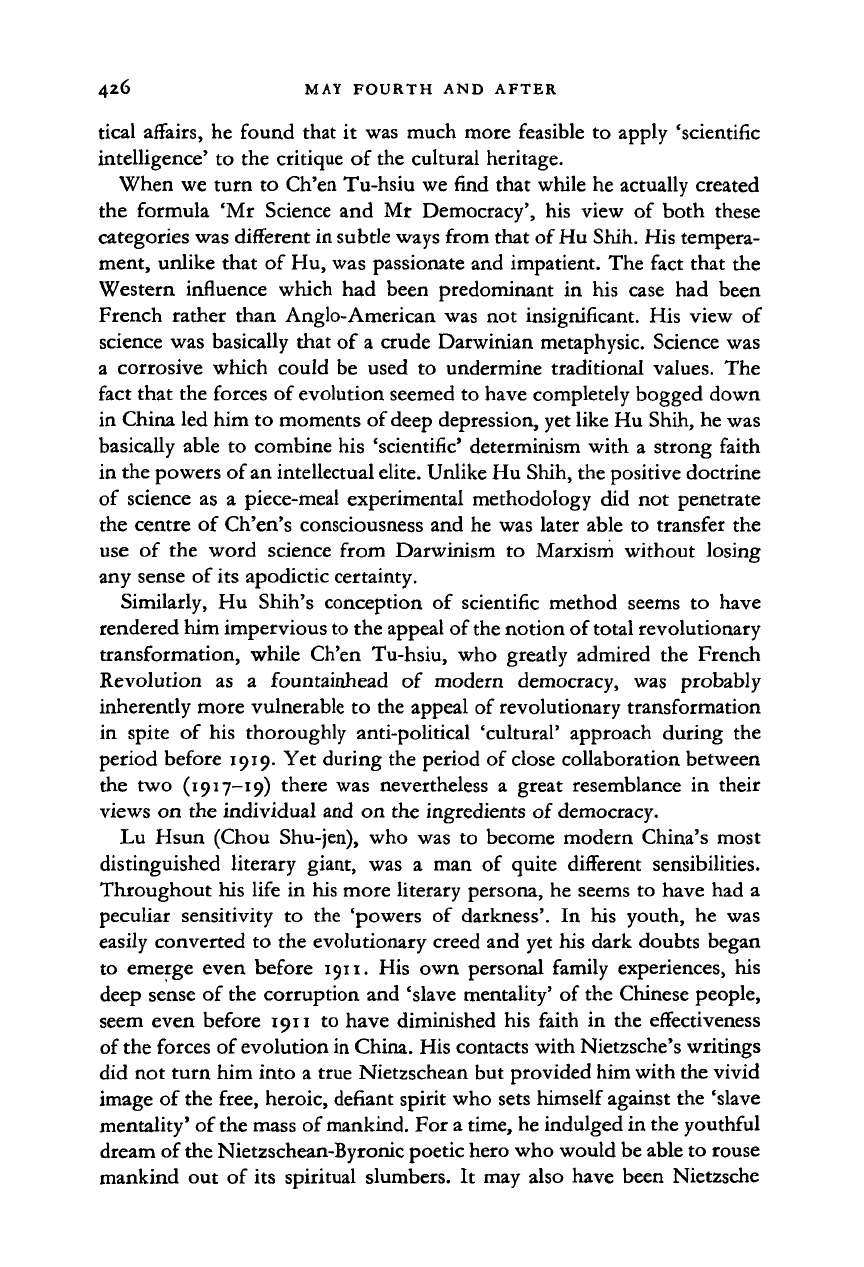
4*6 MAY FOURTH AND AFTER
tical affairs, he found that it was much more feasible to apply 'scientific
intelligence' to the critique of the cultural heritage.
When we turn to Ch'en Tu-hsiu we find that while he actually created
the formula 'Mr Science and Mr Democracy', his view of both these
categories was different in subtle ways from that of Hu Shih. His tempera-
ment, unlike that of Hu, was passionate and impatient. The fact that the
Western influence which had been predominant in his case had been
French rather than Anglo-American was not insignificant. His view of
science was basically that of a crude Darwinian metaphysic. Science was
a corrosive which could be used to undermine traditional values. The
fact that the forces of evolution seemed to have completely bogged down
in China led him to moments of deep depression, yet like Hu Shih, he was
basically able to combine his 'scientific' determinism with a strong faith
in the powers of an intellectual elite. Unlike Hu Shih, the positive doctrine
of science as a piece-meal experimental methodology did not penetrate
the centre of Ch'en's consciousness and he was later able to transfer the
use of the word science from Darwinism to Marxism without losing
any sense of its apodictic certainty.
Similarly, Hu Shih's conception of scientific method seems to have
rendered him impervious to the appeal of
the
notion of total revolutionary
transformation, while Ch'en Tu-hsiu, who greatly admired the French
Revolution as a fountainhead of modern democracy, was probably
inherently more vulnerable to the appeal of revolutionary transformation
in spite of his thoroughly anti-political 'cultural' approach during the
period before 1919. Yet during the period of close collaboration between
the two (1917-19) there was nevertheless a great resemblance in their
views on the individual and on the ingredients of democracy.
Lu Hsun (Chou Shu-jen), who was to become modern China's most
distinguished literary giant, was a man of quite different sensibilities.
Throughout his life in his more literary persona, he seems to have had a
peculiar sensitivity to the 'powers of darkness'. In his youth, he was
easily converted to the evolutionary creed and yet his dark doubts began
to emerge even before 1911. His own personal family experiences, his
deep sense of the corruption and 'slave mentality' of the Chinese people,
seem even before 1911 to have diminished his faith in the effectiveness
of the forces of evolution in China. His contacts with Nietzsche's writings
did not turn him into a true Nietzschean but provided him with the vivid
image of the free, heroic, defiant spirit who sets himself against the 'slave
mentality' of the mass of mankind. For a time, he indulged in the youthful
dream of the Nietzschean-Byronic poetic hero who would be able to rouse
mankind out of its spiritual slumbers. It may also have been Nietzsche
Cambridge Histories Online © Cambridge University Press, 2008
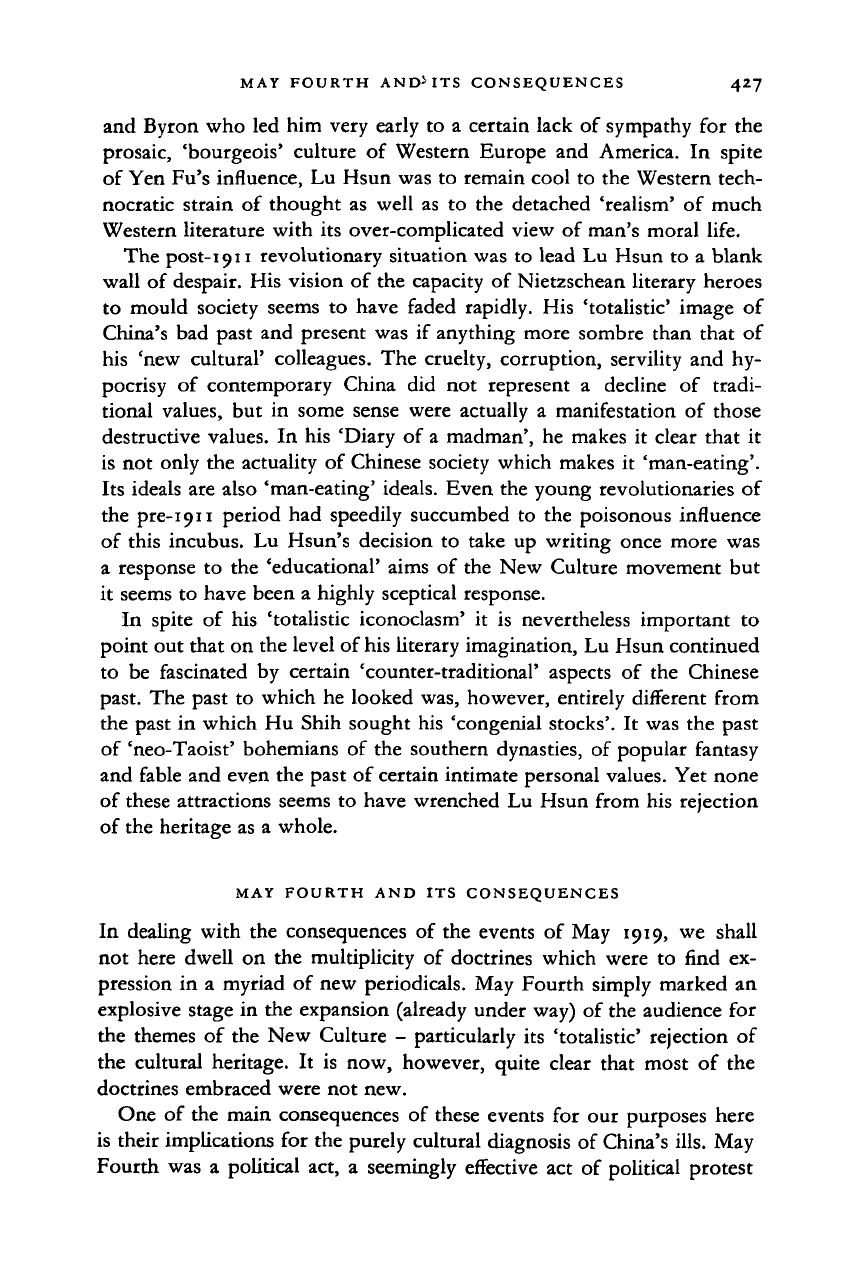
MAY FOURTH AND'ITS CONSEQUENCES 427
and Byron who led him very early to a certain lack of sympathy for the
prosaic, 'bourgeois' culture of Western Europe and America. In spite
of Yen Fu's influence, Lu Hsun was to remain cool to the Western tech-
nocratic strain of thought as well as to the detached 'realism' of much
Western literature with its over-complicated view of man's moral life.
The post-1911 revolutionary situation was to lead Lu Hsun to a blank
wall of despair. His vision of the capacity of Nietzschean literary heroes
to mould society seems to have faded rapidly. His 'totalistic' image of
China's bad past and present was if anything more sombre than that of
his 'new cultural' colleagues. The cruelty, corruption, servility and hy-
pocrisy of contemporary China did not represent a decline of tradi-
tional values, but in some sense were actually a manifestation of those
destructive values. In his 'Diary of a madman', he makes it clear that it
is not only the actuality of Chinese society which makes it 'man-eating'.
Its ideals are also 'man-eating' ideals. Even the young revolutionaries of
the pre-1911 period had speedily succumbed to the poisonous influence
of this incubus. Lu Hsun's decision to take up writing once more was
a response to the 'educational' aims of the New Culture movement but
it seems to have been a highly sceptical response.
In spite of his 'totalistic iconodasm' it is nevertheless important to
point out that on the level of his literary imagination, Lu Hsun continued
to be fascinated by certain 'counter-traditional' aspects of the Chinese
past. The past to which he looked was, however, entirely different from
the past in which Hu Shih sought his 'congenial stocks'. It was the past
of 'neo-Taoist' bohemians of the southern dynasties, of popular fantasy
and fable and even the past of certain intimate personal values. Yet none
of these attractions seems to have wrenched Lu Hsun from his rejection
of the heritage as a whole.
MAY FOURTH AND ITS CONSEQUENCES
In dealing with the consequences of the events of May 1919, we shall
not here dwell on the multiplicity of doctrines which were to find ex-
pression in a myriad of new periodicals. May Fourth simply marked an
explosive stage in the expansion (already under way) of the audience for
the themes of the New Culture - particularly its 'totalistic' rejection of
the cultural heritage. It is now, however, quite clear that most of the
doctrines embraced were not new.
One of the main consequences of these events for our purposes here
is their implications for the purely cultural diagnosis of China's ills. May
Fourth was a political act, a seemingly effective act of political protest
Cambridge Histories Online © Cambridge University Press, 2008
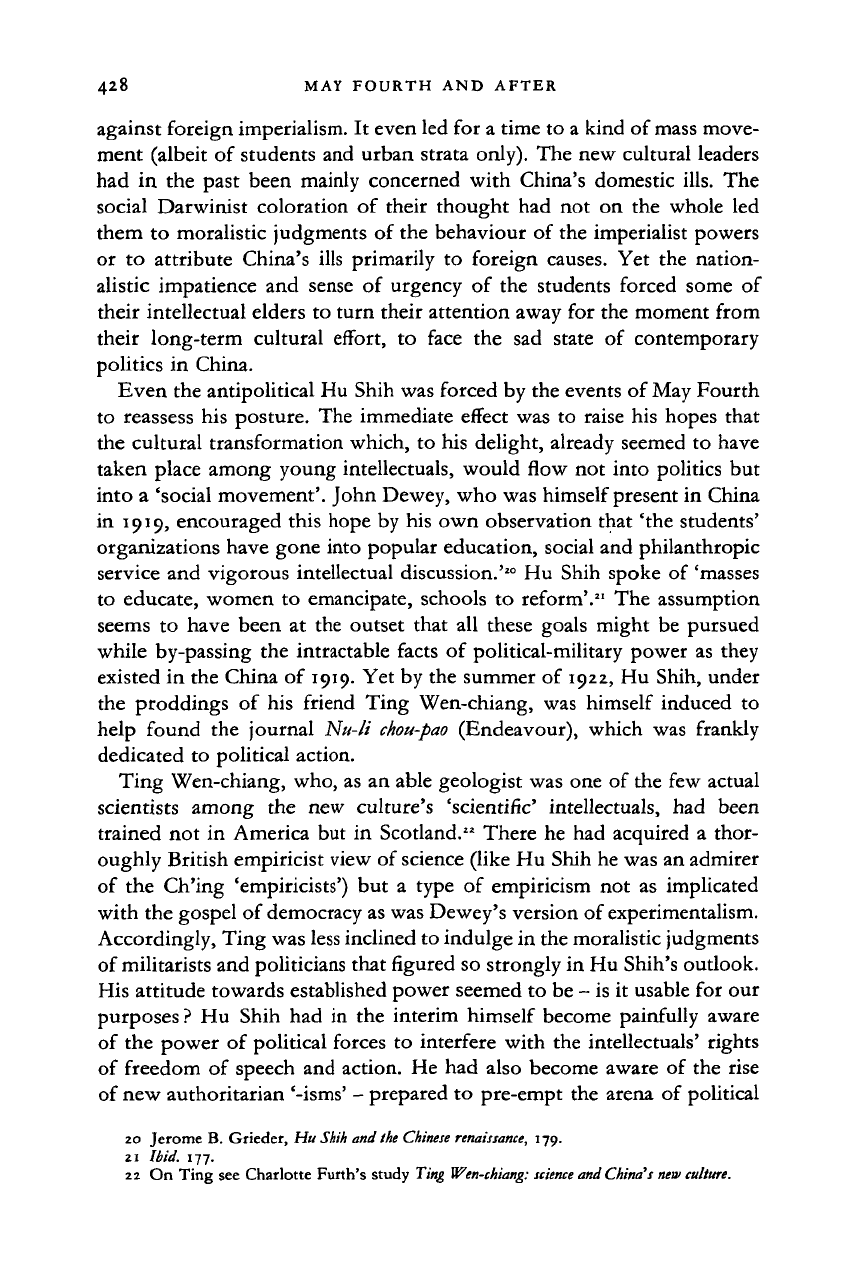
428 MAY FOURTH AND AFTER
against foreign imperialism. It even led for a time to a kind of mass move-
ment (albeit of students and urban strata only). The new cultural leaders
had in the past been mainly concerned with China's domestic ills. The
social Darwinist coloration of their thought had not on the whole led
them to moralistic judgments of the behaviour of the imperialist powers
or to attribute China's ills primarily to foreign causes. Yet the nation-
alistic impatience and sense of urgency of the students forced some of
their intellectual elders to turn their attention away for the moment from
their long-term cultural effort, to face the sad state of contemporary
politics in China.
Even the antipolitical Hu Shih was forced by the events of May Fourth
to reassess his posture. The immediate effect was to raise his hopes that
the cultural transformation which, to his delight, already seemed to have
taken place among young intellectuals, would flow not into politics but
into a 'social movement'. John Dewey, who was himself present in China
in 1919, encouraged this hope by his own observation that 'the students'
organizations have gone into popular education, social and philanthropic
service and vigorous intellectual discussion.'
20
Hu Shih spoke of 'masses
to educate, women to emancipate, schools to reform'.
21
The assumption
seems to have been at the outset that all these goals might be pursued
while by-passing the intractable facts of political-military power as they
existed in the China of 1919. Yet by the summer of 1922, Hu Shih, under
the proddings of his friend Ting Wen-chiang, was himself induced to
help found the journal Nu-li
chou-pao
(Endeavour), which was frankly
dedicated to political action.
Ting Wen-chiang, who, as an able geologist was one of the few actual
scientists among the new culture's 'scientific' intellectuals, had been
trained not in America but in Scotland.
22
There he had acquired a thor-
oughly British empiricist view of science (like Hu Shih he was an admirer
of the Ch'ing 'empiricists') but a type of empiricism not as implicated
with the gospel of democracy as was Dewey's version of experimentalism.
Accordingly, Ting was less inclined to indulge in the moralistic judgments
of militarists and politicians that figured so strongly in Hu Shih's outlook.
His attitude towards established power seemed to be - is it usable for our
purposes
?
Hu Shih had in the interim himself become painfully aware
of the power of political forces to interfere with the intellectuals' rights
of freedom of speech and action. He had also become aware of the rise
of new authoritarian '-isms' - prepared to pre-empt the arena of political
20 Jerome B. Grieder, Hu Shih and
the Chinese
renaissance,
179.
21
Ibid.
177.
22 On Ting see Charlotte Furth's study Ting
Wen-chiang:
science
and China's
new
culture.
Cambridge Histories Online © Cambridge University Press, 2008
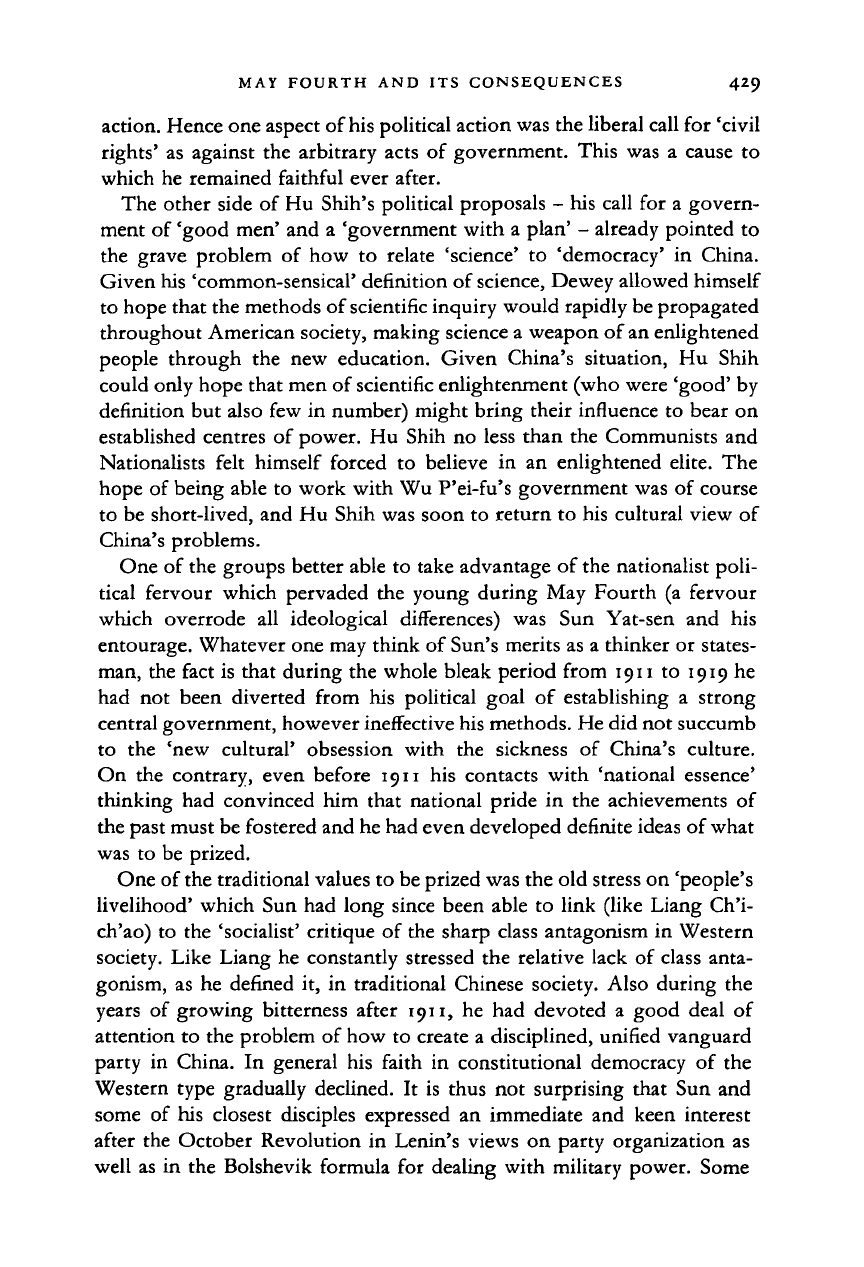
MAY FOURTH AND ITS CONSEQUENCES 429
action. Hence one aspect of
his
political action was the liberal call for 'civil
rights'
as against the arbitrary acts of government. This was a cause to
which he remained faithful ever after.
The other side of Hu Shih's political proposals - his call for a govern-
ment of 'good men' and a 'government with a plan' - already pointed to
the grave problem of how to relate 'science' to 'democracy' in China.
Given his 'common-sensical' definition of
science,
Dewey allowed himself
to hope that the methods of scientific inquiry would rapidly be propagated
throughout American society, making science a weapon of an enlightened
people through the new education. Given China's situation, Hu Shih
could only hope that men of scientific enlightenment (who were 'good' by
definition but also few in number) might bring their influence to bear on
established centres of power. Hu Shih no less than the Communists and
Nationalists felt himself forced to believe in an enlightened elite. The
hope of being able to work with Wu P'ei-fu's government was of course
to be short-lived, and Hu Shih was soon to return to his cultural view of
China's problems.
One of the groups better able to take advantage of the nationalist poli-
tical fervour which pervaded the young during May Fourth (a fervour
which overrode all ideological differences) was Sun Yat-sen and his
entourage. Whatever one may think of Sun's merits as a thinker or states-
man, the fact is that during the whole bleak period from 1911 to I9i9he
had not been diverted from his political goal of establishing a strong
central government, however ineffective his methods. He did not succumb
to the 'new cultural' obsession with the sickness of China's culture.
On the contrary, even before 1911 his contacts with 'national essence'
thinking had convinced him that national pride in the achievements of
the past must be fostered and he had even developed definite ideas of what
was to be prized.
One of the traditional values to be prized was the old stress on 'people's
livelihood' which Sun had long since been able to link (like Liang Ch'i-
ch'ao) to the 'socialist' critique of the sharp class antagonism in Western
society. Like Liang he constantly stressed the relative lack of class anta-
gonism, as he defined it, in traditional Chinese society. Also during the
years of growing bitterness after 1911, he had devoted a good deal of
attention to the problem of how to create a disciplined, unified vanguard
party in China. In general his faith in constitutional democracy of the
Western type gradually declined. It is thus not surprising that Sun and
some of his closest disciples expressed an immediate and keen interest
after the October Revolution in Lenin's views on party organization as
well as in the Bolshevik formula for dealing with military power. Some
Cambridge Histories Online © Cambridge University Press, 2008
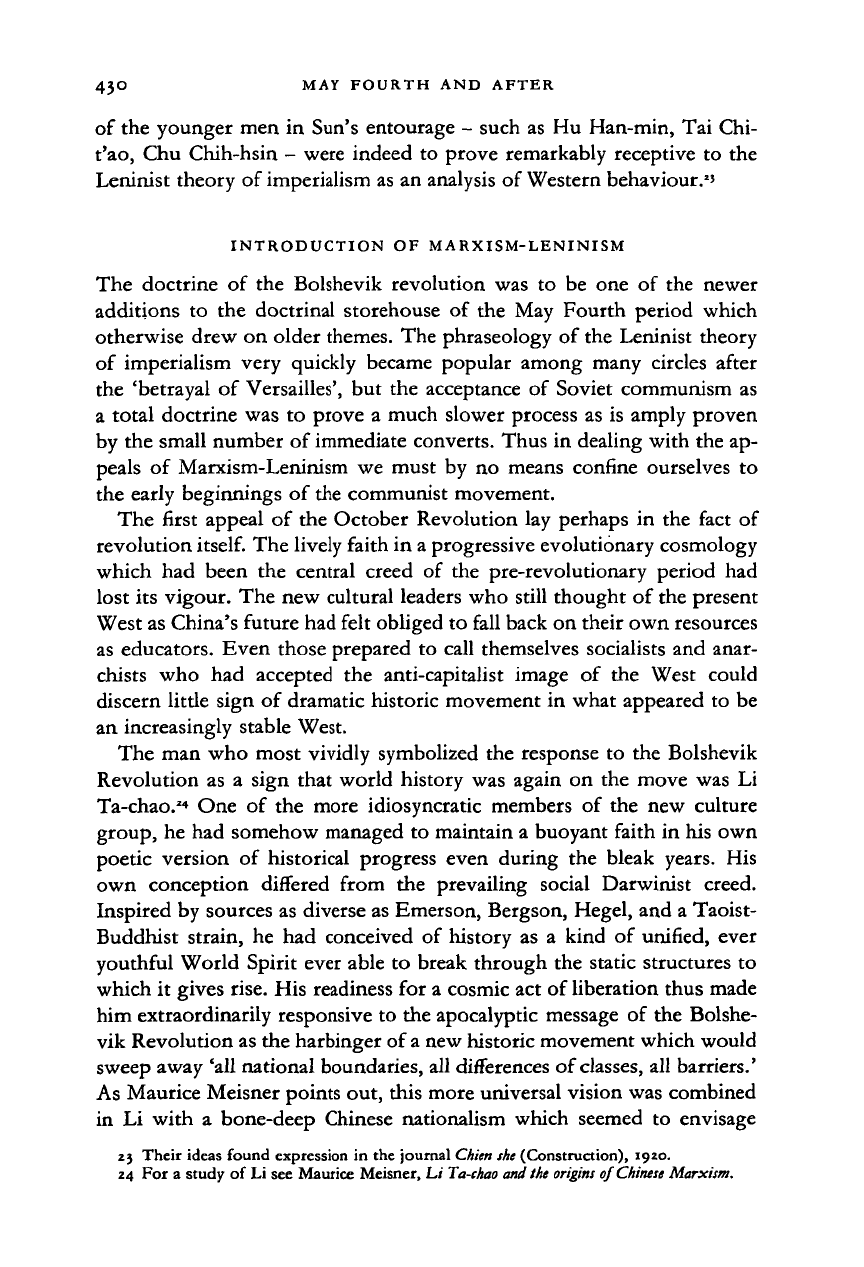
43° MAY FOURTH AND AFTER
of the younger men
in
Sun's entourage
-
such
as Hu
Han-min, Tai Chi-
t'ao,
Chu Chih-hsin
-
were indeed
to
prove remarkably receptive
to the
Leninist theory
of
imperialism as an analysis
of
Western behaviour.
2
'
INTRODUCTION OF MARXISM-LENINISM
The doctrine
of
the Bolshevik revolution
was to be one of
the newer
additions
to the
doctrinal storehouse
of
the May Fourth period which
otherwise drew on older themes. The phraseology
of
the Leninist theory
of imperialism very quickly became popular among many circles after
the 'betrayal
of
Versailles',
but the
acceptance
of
Soviet communism
as
a total doctrine was
to
prove
a
much slower process
as is
amply proven
by the small number
of
immediate converts. Thus
in
dealing with the ap-
peals
of
Marxism-Leninism
we
must
by no
means confine ourselves
to
the early beginnings
of
the communist movement.
The first appeal
of
the October Revolution lay perhaps
in the
fact
of
revolution
itself.
The lively faith in a progressive evolutionary cosmology
which
had
been
the
central creed
of the
pre-revolutionary period
had
lost its vigour. The new cultural leaders who still thought
of
the present
West as China's future had felt obliged to fall back on their own resources
as educators. Even those prepared
to
call themselves socialists and anar-
chists
who had
accepted
the
anti-capitalist image
of the
West could
discern little sign
of
dramatic historic movement
in
what appeared
to be
an increasingly stable West.
The man who most vividly symbolized the response
to the
Bolshevik
Revolution
as a
sign that world history was again
on the
move was
Li
Ta-chao.
24
One of the
more idiosyncratic members
of the new
culture
group,
he
had somehow managed
to
maintain a buoyant faith
in
his own
poetic version
of
historical progress even during
the
bleak years.
His
own conception differed from
the
prevailing social Darwinist creed.
Inspired by sources as diverse as Emerson, Bergson, Hegel, and a Taoist-
Buddhist strain,
he had
conceived
of
history
as a
kind
of
unified, ever
youthful World Spirit ever able
to
break through the static structures
to
which
it
gives rise. His readiness
for
a cosmic act
of
liberation thus made
him extraordinarily responsive
to
the apocalyptic message
of
the Bolshe-
vik Revolution as the harbinger of
a
new historic movement which would
sweep away 'all national boundaries, all differences of
classes,
all barriers.'
As Maurice Meisner points out, this more universal vision was combined
in
Li
with
a
bone-deep Chinese nationalism which seemed
to
envisage
23 Their ideas found expression
in
the journal
Chlen she
(Construction), 1920.
24 For
a
study
of
Li see Maurice Meisner,
Li
Ta-chao
and
the origins
oj
Chinese
Marxism.
Cambridge Histories Online © Cambridge University Press, 2008
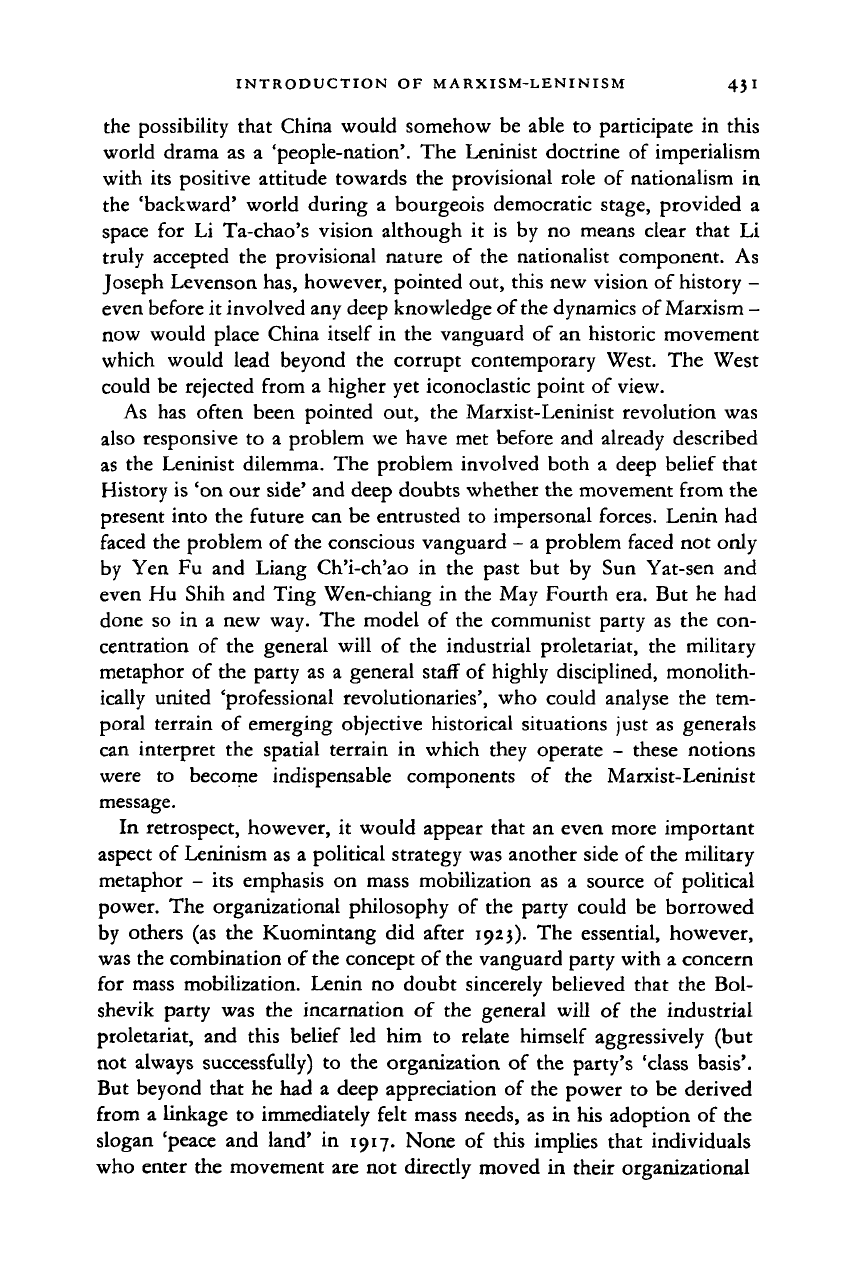
INTRODUCTION OF MARXISM-LENINISM 43 I
the possibility that China would somehow be able to participate in this
world drama as a 'people-nation'. The Leninist doctrine of imperialism
with its positive attitude towards the provisional role of nationalism in
the 'backward' world during a bourgeois democratic stage, provided a
space for Li Ta-chao's vision although it is by no means clear that Li
truly accepted the provisional nature of the nationalist component. As
Joseph Levenson has, however, pointed out, this new vision of history -
even before it involved any deep knowledge of
the
dynamics of Marxism -
now would place China itself in the vanguard of an historic movement
which would lead beyond the corrupt contemporary West. The West
could be rejected from a higher yet iconoclastic point of view.
As has often been pointed out, the Marxist-Leninist revolution was
also responsive to a problem we have met before and already described
as the Leninist dilemma. The problem involved both a deep belief that
History is 'on our side' and deep doubts whether the movement from the
present into the future can be entrusted to impersonal forces. Lenin had
faced the problem of the conscious vanguard - a problem faced not only
by Yen Fu and Liang Ch'i-ch'ao in the past but by Sun Yat-sen and
even Hu Shih and Ting Wen-chiang in the May Fourth era. But he had
done so in a new way. The model of the communist party as the con-
centration of the general will of the industrial proletariat, the military
metaphor of the party as a general staff of highly disciplined, monolith-
ically united 'professional revolutionaries', who could analyse the tem-
poral terrain of emerging objective historical situations just as generals
can interpret the spatial terrain in which they operate - these notions
were to become indispensable components of the Marxist-Leninist
message.
In retrospect, however, it would appear that an even more important
aspect of Leninism as a political strategy was another side of the military
metaphor - its emphasis on mass mobilization as a source of political
power. The organizational philosophy of the party could be borrowed
by others (as the Kuomintang did after 1923). The essential, however,
was the combination of the concept of the vanguard party with a concern
for mass mobilization. Lenin no doubt sincerely believed that the Bol-
shevik party was the incarnation of the general will of the industrial
proletariat, and this belief led him to relate himself aggressively (but
not always successfully) to the organization of the party's 'class basis'.
But beyond that he had a deep appreciation of the power to be derived
from a linkage to immediately felt mass needs, as in his adoption of the
slogan 'peace and land' in 1917. None of this implies that individuals
who enter the movement are not directly moved in their organizational
Cambridge Histories Online © Cambridge University Press, 2008
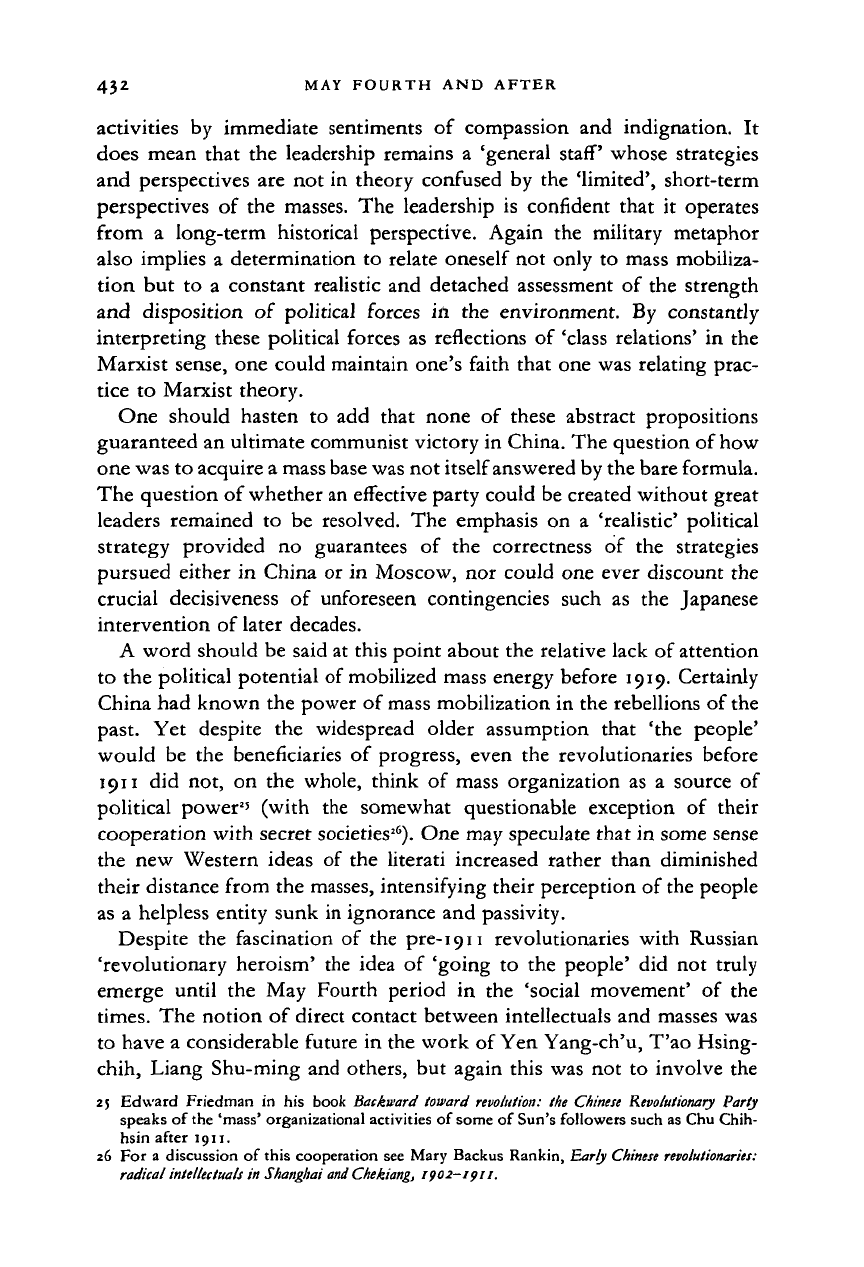
MAY FOURTH
AND
AFTER
activities
by
immediate sentiments
of
compassion
and
indignation.
It
does mean that
the
leadership remains
a
'general
staff'
whose strategies
and perspectives
are not in
theory confused
by the
'limited', short-term
perspectives
of the
masses.
The
leadership
is
confident that
it
operates
from
a
long-term historical perspective. Again
the
military metaphor
also implies
a
determination
to
relate oneself
not
only
to
mass mobiliza-
tion
but to a
constant realistic
and
detached assessment
of the
strength
and disposition
of
political forces
in the
environment.
By
constantly
interpreting these political forces
as
reflections
of
'class relations'
in the
Marxist sense,
one
could maintain one's faith that
one was
relating prac-
tice
to
Marxist theory.
One should hasten
to add
that none
of
these abstract propositions
guaranteed
an
ultimate communist victory
in
China.
The
question
of
how
one was
to
acquire
a
mass base was
not
itself answered
by
the bare formula.
The question
of
whether
an
effective party could
be
created without great
leaders remained
to be
resolved.
The
emphasis
on a
'realistic' political
strategy provided
no
guarantees
of the
correctness
of the
strategies
pursued either
in
China
or in
Moscow,
nor
could
one
ever discount
the
crucial decisiveness
of
unforeseen contingencies such
as the
Japanese
intervention
of
later decades.
A word should
be
said
at
this point about
the
relative lack
of
attention
to
the
political potential
of
mobilized mass energy before
1919.
Certainly
China
had
known
the
power
of
mass mobilization
in the
rebellions
of
the
past.
Yet
despite
the
widespread older assumption that
'the
people'
would
be the
beneficiaries
of
progress, even
the
revolutionaries before
1911
did not, on the
whole, think
of
mass organization
as a
source
of
political power
2
' (with
the
somewhat questionable exception
of
their
cooperation with secret societies
26
).
One may
speculate that
in
some sense
the
new
Western ideas
of the
literati increased rather than diminished
their distance from
the
masses, intensifying their perception
of
the people
as
a
helpless entity sunk
in
ignorance
and
passivity.
Despite
the
fascination
of the
pre-1911 revolutionaries with Russian
'revolutionary heroism'
the
idea
of
'going
to the
people'
did not
truly
emerge until
the May
Fourth period
in the
'social movement'
of the
times.
The
notion
of
direct contact between intellectuals
and
masses
was
to have
a
considerable future
in the
work
of
Yen Yang-ch'u,
T'ao
Hsing-
chih, Liang Shu-ming
and
others,
but
again this
was not to
involve
the
25 Edward Friedman
in his
book Backward toward revolution:
the
Chinese Revolutionary Party
speaks of the 'mass' organizational activities of some of Sun's followers such as Chu Chih-
hsin after 1911.
26 For a discussion of this cooperation see Mary Backus Rankin, Early
Chinese
revolutionaries:
radical intellectuals
in
Shanghai
and
Chekiang,
Cambridge Histories Online © Cambridge University Press, 2008
